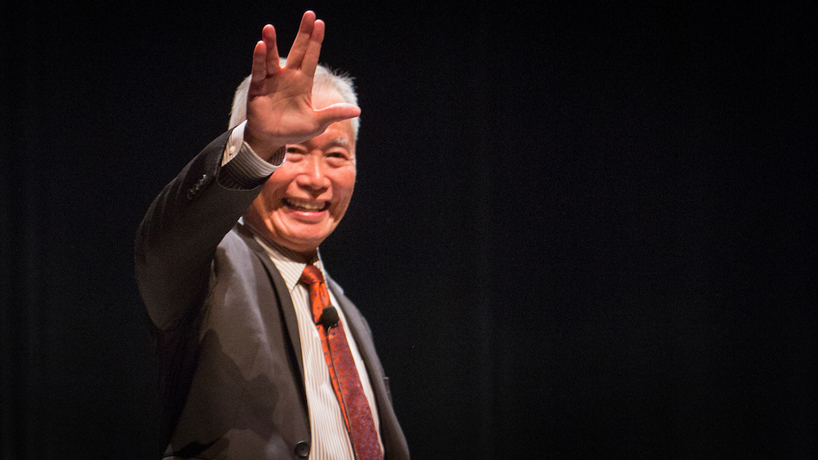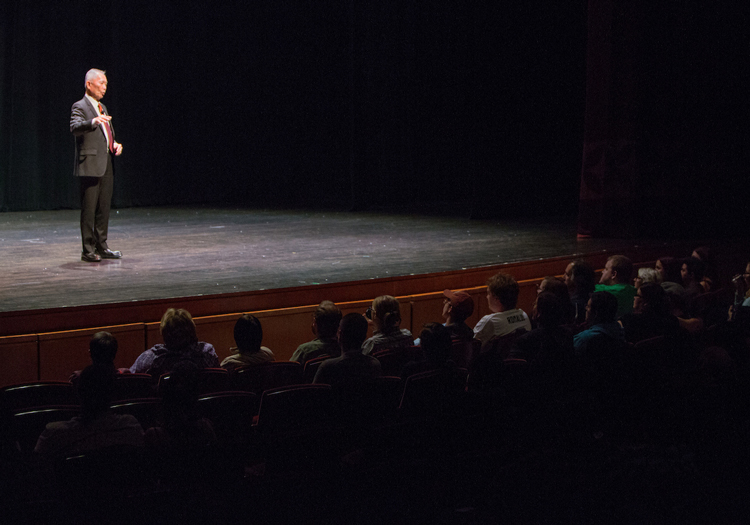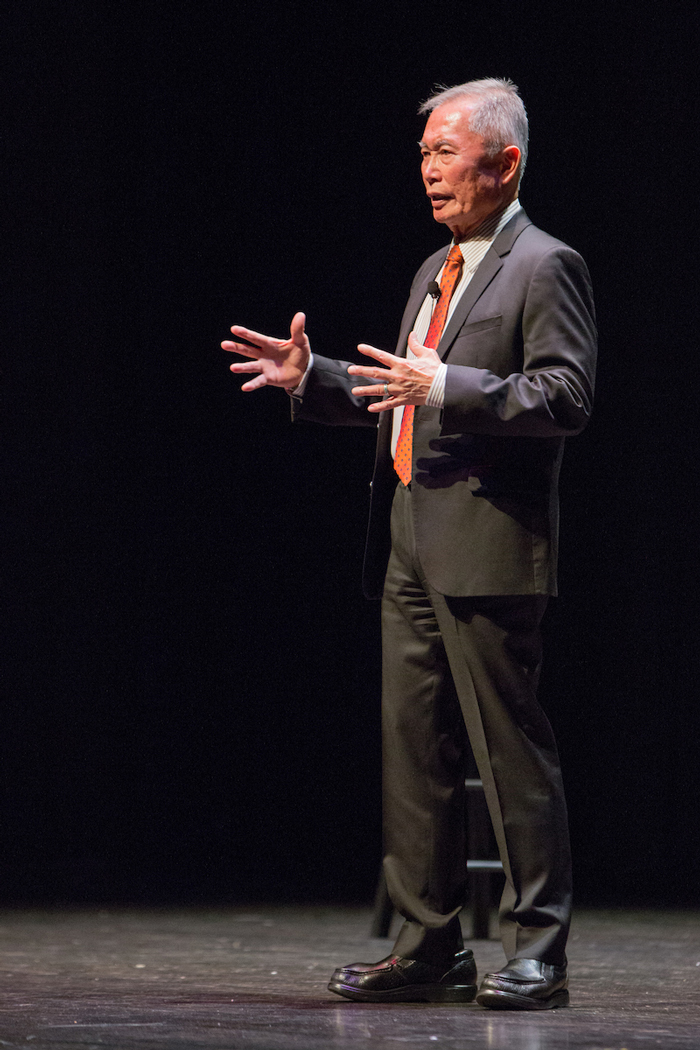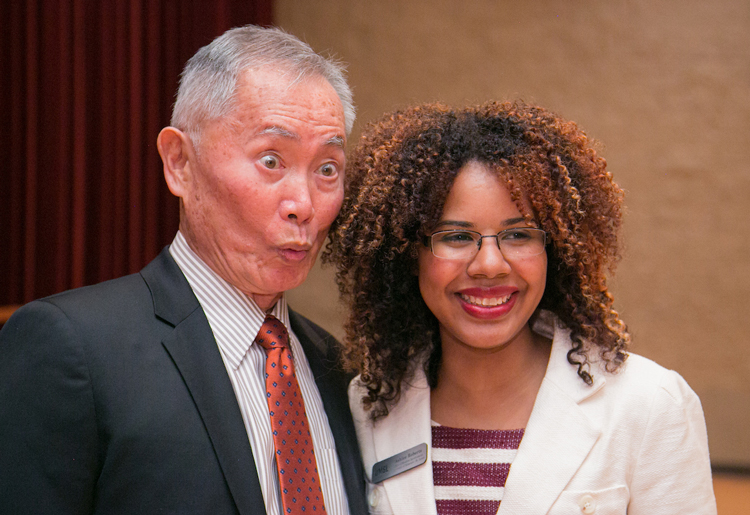
The celebrated actor and activist spoke at UMSL Nov. 10 as part of the Office of Student Involvement speaker series. (Photos by Rebecca Barr)
By Evie Hemphill and Steve Walentik
The instant George Takei walked on stage at the University of Missouri–St. Louis last week, the crowd went wild.
“Oh my,” responded the acclaimed actor and activist, best known for his role as Hikaru Sulu in Star Trek.
This added laughter to the happy cacophony of applause and cheers. But once the large theater finally grew quiet, Takei took the audience on a sobering journey – not into the 23rd century aboard the USS Enterprise but rather back in time, to the early 1940s.
A young child during World War II, Takei shared what it was like to be categorized as an “enemy alien” by his own country in the wake of Japan’s attack on Pearl Harbor. He described watching through a window at age 5 as U.S. soldiers marched up his family’s driveway in California to order them out of their home at gunpoint.

Speaking to UMSL students and community members at the Blanche M. Touhill Performing Arts Center, George Takei shared his own journey – and his hopes and fears for a country he loves.
“I will never be able to forget that scene – it’s seared into my memory,” said Takei, who along with his parents, siblings and roughly 120,000 fellow Japanese Americans was forced at the command of President Franklin D. Roosevelt to live in imprisonment until the end of the conflict three years later.
During the internment, other troubling scenes and images would come to stick with Takei as well, he told the audience of UMSL students and community members. There were the sentry towers, the barbed-wire fences – and the wrenching irony of reciting the Pledge of Allegiance with the words “with liberty and justice for all” while surrounded by such reminders of confinement.
Living through that period, which Takei called “one of the darkest chapters in American history,” made working with Gene Roddenberry and the cast of the Star Trek project two decades later seem, by contrast, a kind of utopia. For Takei it was a metaphor for human harmony, the epitome of “diversity coming together and working in concert,” he said.
But even as Takei relished his growing career and the American democracy, he was learning through life experience and from his father that his country’s ideals and realities didn’t always line up.

During his talk at UMSL last week, George Takei took the audience on a sobering journey – not into the 23rd century aboard the USS Enterprise but rather back in time to the early 1940s, when he was imprisoned at age 5 during the internment of Japanese Americans.
“The ideals are noble, but people are also fallible human beings, and they make terrible mistakes,” Takei said during the Nov. 10 talk. “Our democracy is existentially dependent on people who cherish those ideals.”
As an adult, Takei became increasingly active in social justice efforts, including the civil rights movement. He smiled, recalling for the UMSL crowd the moment he met Martin Luther King Jr. at an event.
“He was as inspiring as everything I’d read about in the papers, and I must say this hand that shook his hand didn’t go washed for about three days after,” Takei said.
Before the night was over, Takei also opened up about his journey as a gay man in America – the sense of being different and the loneliness and isolation that came with that as early as age 10 to his decision to come out as an older adult.
“For the first time, in 2005, I talked to the press as a gay man and blasted Arnold Schwarzenegger’s veto [of California’s marriage equality bill],” Takei said.
From there, Takei segued to the events of the divisive 2016 U.S. presidential election that left many Americans, including him, uneasy about the future.
“This is a great country,” he said. “Yes, there are setbacks. Yes, there are disastrous setbacks … but when you look at the scope of American history, we are making progress.”
While the start of Takei’s fame dates back to 1966 and the man himself will celebrate his 80th birthday in April, he continues to be extremely influential, connecting easily with members of a generation at least twice removed from his own.
“Because he speaks about relevant topics that we are dealing with today,” said senior UMSL English major Jess Young, who attended Thursday’s event and had an opportunity to meet Takei shortly after it concluded. “He’s been through it all. He’s gone through the civil rights movement. He’s fought for gay rights. He’s seen his friends pass during times where he could have potentially helped them but was afraid to.

George Takei goofs off for the camera while posing with Ashlee Roberts, assistant director of UMSL’s Office of Student Involvement.
“I think that’s one of the things that I related to the most, seeing somebody in need but not being able to help them because you can’t help yourself. There’s nothing uppity about him. He’s relatable, like I said, and that’s really, really important for millennials.”
Young, who since August has served as the president of PRIZM, UMSL’s queer-trans-straight alliance, was particularly moved by Takei’s struggle when younger to be open about his sexuality.
“It was really emotional for me, especially whenever he started talking about how he had to hide himself and he had to act one way even though his true self was a different way,” Young said. “I was really, really moved because I definitely related with that. Whenever he said he always felt like he was different, I always felt that way too.”
Takei answered about a dozen questions from audience members before event organizers brought the evening to a close. He addressed inquiries ranging from Star Trek topics to advice for students grappling with the results of Election Day.
“I’m Latina, I’m native, I’m very gay – and I’m more frightened than I’ve ever been,” began one student during the question-and-answer period. She wanted to know Takei’s advice for his fellow Americans in the days to come.
“It was an unbelievably wrenching evening, and we still haven’t really gotten over it,” Takei said of his and his husband’s feelings about Election Day. “American democracy depends on people like you to be actively engaged in this process.”
He added that a government “of the people, by the people, for the people” often includes heartbreak, exhilarating moments and mistakes.
“And yet here I am talking from this stage at your university,” Takei said, ending on a hopeful note. “I implore all people who hold these ideals of America to be dear: You’ve got to be engaged. We have to participate. It’s easy to say, but it’s time consuming and sometimes costly.”
At a meet-and-greet following his talk, Takei spoke briefly about an upcoming screening of the Broadway musical “Allegiance,” which looks at the internment of Japanese Americans during World War II. Takei, whose own childhood helped inspire the production, stars in the show. The one-night-only screening in movie theaters across the country is set for Dec. 13.















